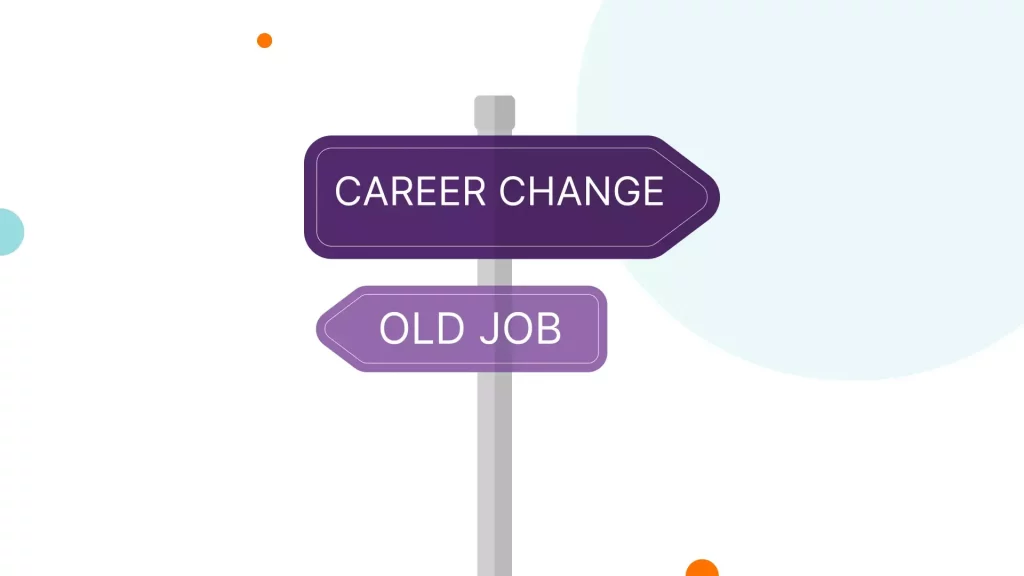
A career transition represents one of the most important professional decisions which people make throughout their lives. People who pursue career changes need to abandon their accumulated work experience from their previous field before beginning their new profession. This tip will help you change a career that matches your personal objectives and current market requirements, while taking into account changing values. The modern career change landscape of 2025 has become unprecedented in its complexity. Many new paths for professional development have materialised through technological advancements, flexible work options, and industry transformations.
Focused planning and dogged determination to achieve your goal will ensure success after the initial enthusiasm. The transition process will become impossible to handle when the fundamental elements are missing. The following seven essential tips will guide you through a successful and fulfilling career transition in 2025.
Steps to Change a Career:

1. Understand Your Motivation to Change a Career:
People need to dedicate time to understanding their career transition reasons before entering their new professional field. The 2025 workforce exhibits a pattern of career changes towards sustainable fields and Technological Sectors that offer personal development opportunities.
Evaluate your situation through these specific criteria as you start to change a career:
- Check if your job dissatisfaction stems from your current tasks or if you dislike the entire industry sector. Your understanding of this situation will show you what changes need to happen.
- Check whether you want higher pay or because you face demanding work hours. Is it a flexible environment you seek, or do you need a career that brings deep personal fulfilment?
- Do you experience thoughts about a career change because you believe the job market will shift against your current organisation’s stability?
The evaluation of these factors will help you achieve both clarity and direction. Your future decision should lead to lasting satisfaction instead of serving as a temporary escape.
2. Research Emerging Trends and Industries:
The career world will undergo an unprecedented rate of transformation in 2025 and the years that follow. Organisations dealing with artificial intelligence, green energy, digital supply chain operations, and work opportunities with full-fledged remote working systems are going to take the world by storm. Reskilling or shifting into these fields with proper training will help you strategically achieve success.
You must devote your time to studying market trends. Here are a few pointers to help in your research:
- Identify companies that are focused on technological expansion in the health sector, cybersecurity, renewable energy, and digital marketing.
- Ignore companies from your list that are slow on automation, and also ignore roles that may become irrelevant in the future due to growth in artificial intelligence.
- Do stay informed on the rate at which salary upgradation is happening for the role you’re targeting.
Mapping your skills with roles and jobs that are in demand will help you achieve both job stability and proper growth.
3. Bridge Skill Gaps with Targeted Learning:
Insufficient relevant skills are the major obstacle people face when transitioning to a new career. These days, you can enjoy myriad learning opportunities – both online and offline. You must use these platforms to learn and acquire new skills quickly.
To address skill gaps:
- Start by determining which technical abilities and soft skills your desired profession requires.
- Enrol in professional training programs that hold proper certification status.
- Gain practical experience through projects and volunteering activities.
- Make use of the learning programs provided by your company.
The act of showing dedication to ongoing education will frequently make up for your lack of direct experience when entering a new career field.
4. Leverage Transferable Skills:
The transferable skills you possess are valuable, irrespective of your experience, or lack thereof, in your target industry.
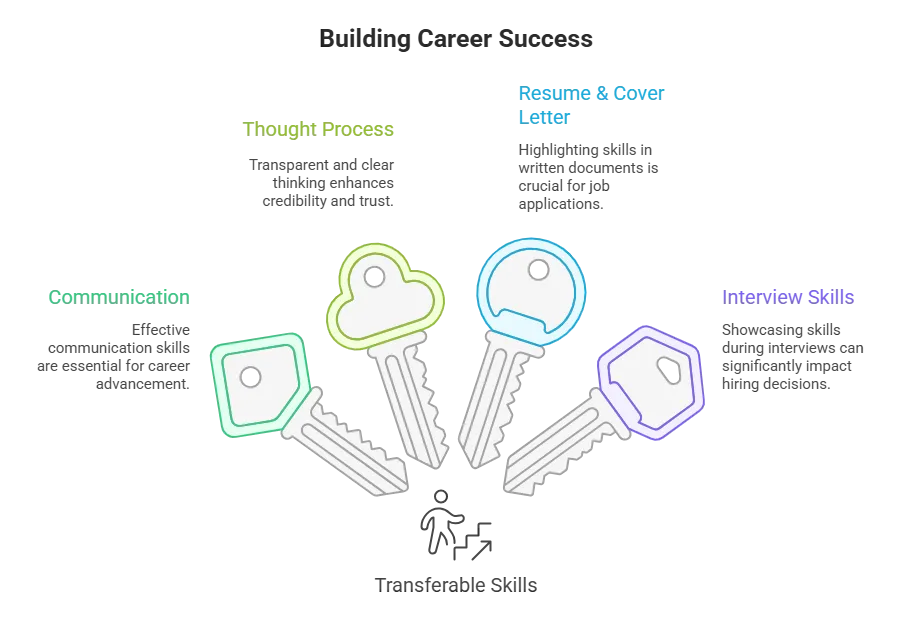
5. Expand and Activate Your Network:
The ability to network effectively stands as one of the most effective methods for people who want to change a career successfully. The research indicates that job openings will become available through professional connections instead of traditional public job listings in 2025. The process of connecting with industry professionals leads to both industry understanding and access to unadvertised career possibilities.
The following methods represent effective ways to network:
- Join groups in LinkedIn that are specific to your industry or role requirement, and also ensure that you are an active participant in most of the conversation chains. This process will also help you identify influential professionals within the group, and you may build your connection with/ them effortlessly.
- Regularly join industry-specific webinars and seminars to improve yourself, stay updated, and at the same time enjoy effective networking.
- Keep an eye on all ongoing and upcoming discussions and interviews by industry leaders and understand the success parameters and opportunities.
- Check on your former colleagues and managers about their transition and rate of success. Also, don’t forget to check with them their opinions about their achievement after the transition.
Remember to nurture your networks to change a career effectively.
6. Test the Waters Before Fully Committing:
You need to dedicate extensive time and energy to change a career because hasty decisions without testing will lead to future disappointment. The modern job market allows people to discover new career options through gig platforms and part-time work arrangements, which support their financial stability.
You could:
- Join any freelance projects or consulting work until you are entirely sure.
- Invest yourself in learning through courses that provide internships and apprenticeships opportunities, even if the duration is small, you will gain experience.
- Observe experienced professionals in their work environment to gain a direct understanding.
- Volunteer work with organisations that match your future career path.
Testing the waters enables you to establish realistic goals while validating your interest and developing preliminary skills before transitioning to a permanent role.
7. Stay Resilient and Patient Through the Transition:
The process of career transition requires resilience as its most vital yet underappreciated element. People who start over in 2025 need to adopt a beginner’s attitude toward their work, even though they bring extensive professional experience to the table. The path through which you change a career will probably include multiple instances of rejection, together with financial changes, and professional setbacks.
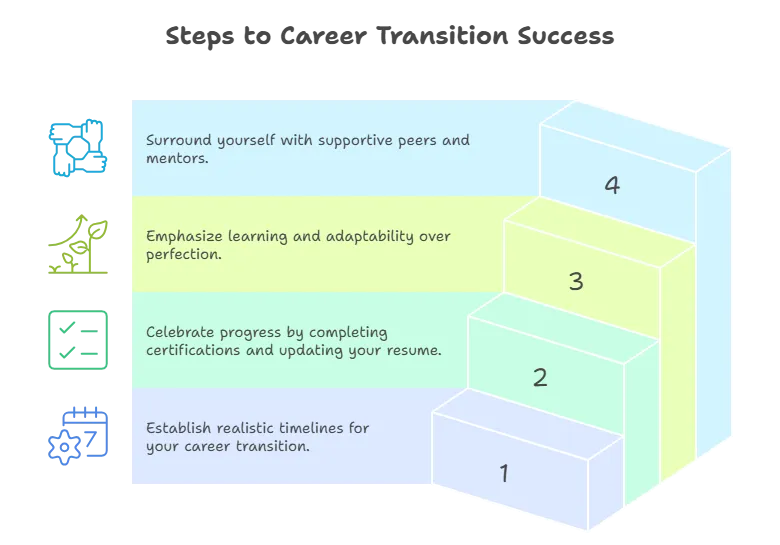
The outcome remains rewarding and sustainable despite obstacles through patience and perseverance.
5 Best Tech Jobs for Career Changers, Advisable for 2025:
AI Engineer, Data Scientist, Cybersecurity Specialist, Robotics Engineer and Software Developer, and Digital Marketing Specialist – these roles reflect high growth, great pay, and relevance in a swiftly changing global economy. Skills in technology and the proper way to digitise business are shaping the future—choose to change a career wisely for success in 2025.
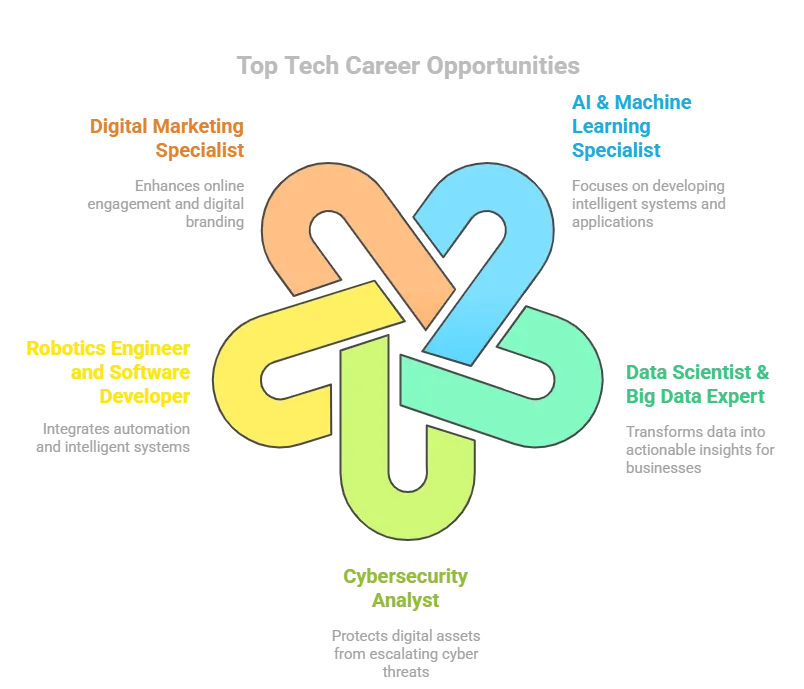
Institutes with Emerging Learning Options -Choose to Change a Career easily:
Here is a list of notable global institutes and platforms offering both offline (in-person) and online education through hybrid or blended learning models in emerging career fields for 2025:
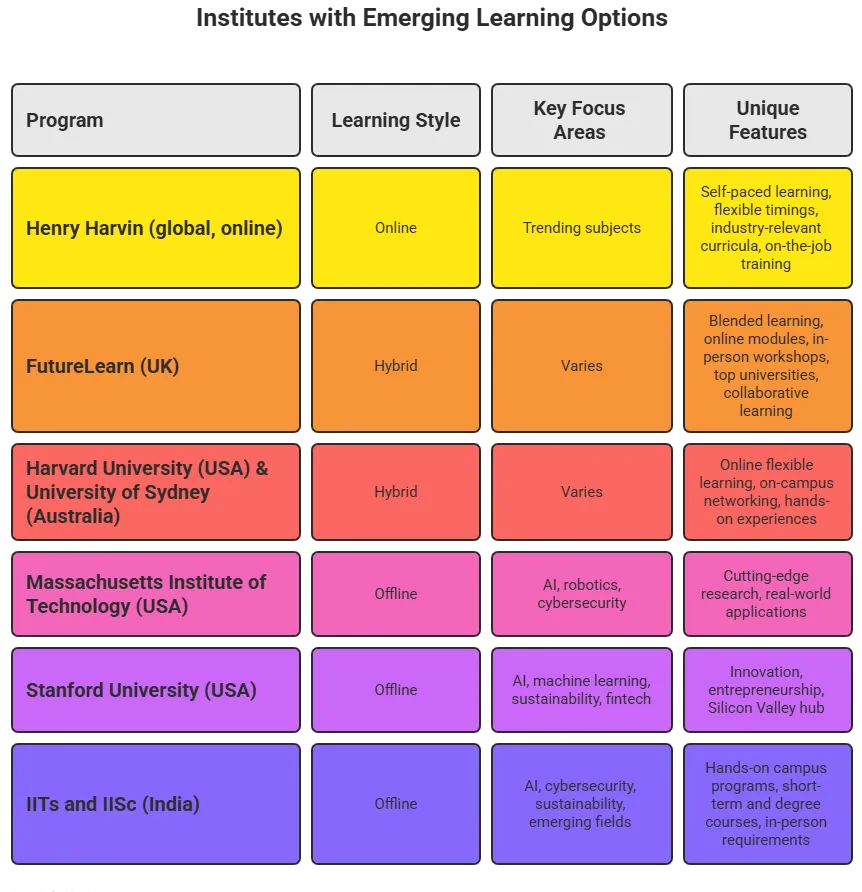
Know the Benefits of Various Learning Modes to Change a Career:
The hybrid learning model provides worldwide flexibility and accessibility to students while maintaining the benefits of classroom interaction.
The combination of AI technology with VR/AR and digital tools enables universities to deliver personalised educational experiences through their hybrid and online teaching methods.
The two educational models provide distance learning opportunities to students who need to study remotely, work full-time, or seek international qualifications from their current location.
Future-ready learning programs at global institutions combine online and offline education to prepare students for new career requirements.
List of Trending Job Courses Available at Henry Harvin:

- SAP: Take data-driven decisions for your organisation and also streamline process effortlessly with training from Henry Harvin·
- Cyber Security: Combat data misuse effectively while you build a secure system through this course. Also, learn here industry-relevant techniques to have a noteworthy profile that everybody aspires to.
- Data Science: Learn here the right way to transform your organisation’s raw data to actionable insights easily. Data Science is the most demanded course that not only can help your organisation grow but also add value to your profile.
- Six sigma training: Minimise your work flaws and variabilities by having a six-sigma training. Enjoy one-on-one coaching, tailored curricula and much more when you learn from here.
- Supply Chain Management: Learn Supply Chain Management to boost your career growth effectively. Get the right expertise in logistics, procurement, and operations while you also develop strategic planning and operational efficiency with this course from Henry Harvin.
- PMP: Lead your projects effectively while you manage risk and deliver on time with a PMP certification. Join now to get the proper industry-based exposure and training.
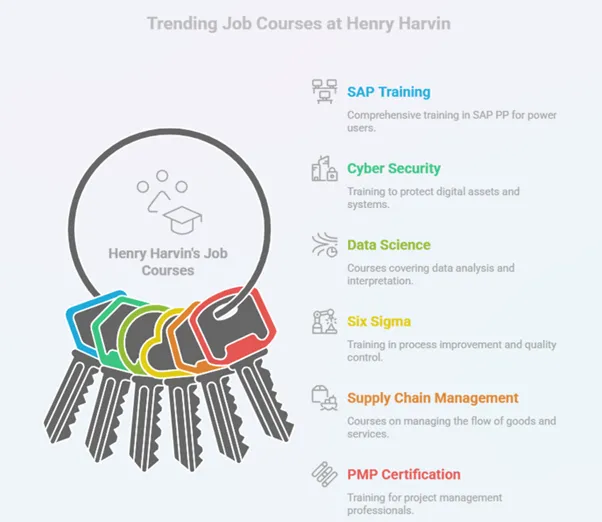
Conclusion
These days, merely switching jobs isn’t enough to change a career. You need to create, in fact, a new professional identity that matches the evolving world of innovation and changing values. Your career transition will succeed when you understand your reasons to change a career. Always explore new industries, develop necessary skills, use your professional connections, and stay determined to achieve success while you are transitioning.
The challenging process enables you to find work that matches your actual goals while preparing you for upcoming workplace requirements. The seven strategic tips to change a career as discussed above are sure to provide you with success. All you need to do is execute with commitment and change a career into a successful professional journey.
Recommended Reads:
- Why Henry Harvin is the Best Choice for PMP Corporate Training?
- Why A Supply Chain Certification is Your Next Career Move?
- What Is Six Sigma? A Beginner’s Guide to Quality Management
- The Future of Data Science: Opportunities and Challenges
- What Is Corporate Training And Why You Should Invest In This?
FAQs:
Ans: Regularly assess your skills and values to identify your personal interests. Focus your research on discovering new career paths that match your objectives while identifying relevant abilities you already possess. Define a transition plan with steps to acquire new skills and certifications to manage the career shift effectively.
Ans: A return to school becomes necessary for a career transition only when specific circumstances require it. The majority of industries base their hiring decisions on candidates’ transferable abilities and work history instead of their academic background.
Ans: A successful career transition does not need a formal degree because short-term certifications, online courses, and specialised training programs hold greater value. The training options provide quick and affordable access to essential skills which emerging industries and technology sectors value above all else.
Ans: You can build credibility by working as a freelancer or volunteer, and also by taking on side projects. The combination of internships and contract work provides entry points for professionals at any stage of their career. Your professional development journey should include creating a portfolio that showcases your work alongside case studies.
Ans: The main challenges to changing careers include starting anew and navigating pay reductions and market unpredictability. Your career transition will succeed when you focus on your existing abilities and maintain flexibility while getting help from career mentors and coaches to handle professional obstacles.
